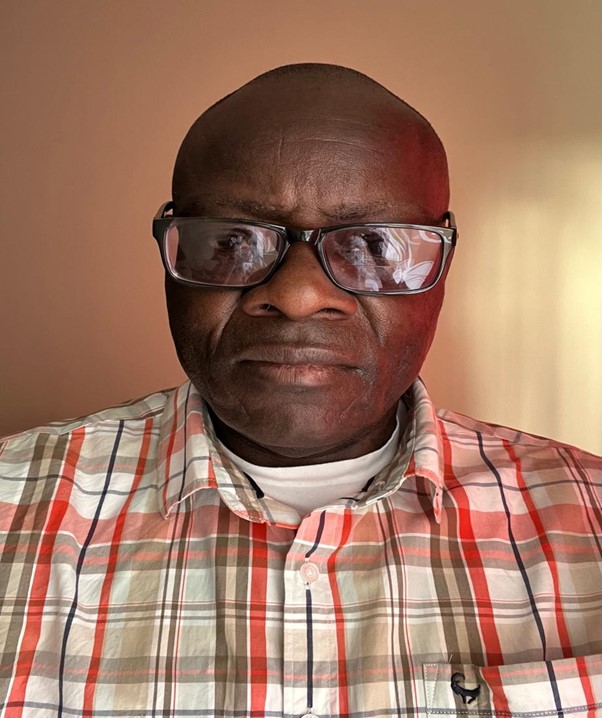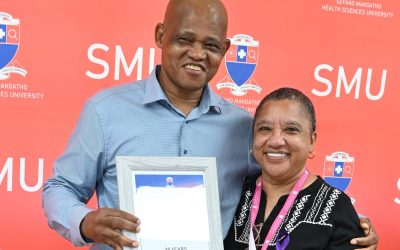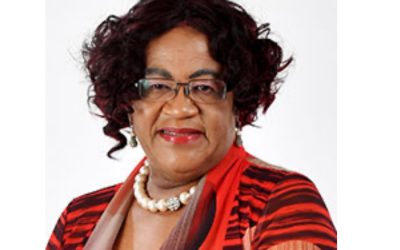Dr Benson Chuks Iweriebor, a postdoctoral fellow in the Department of Biology and Environmental Science at Sefako Makgatho Health Sciences University (SMU), has been awarded a C2 rating by South Africa’s National Research Foundation (NRF), recognising him as an established researcher with a sustained record of high-quality scientific output.
 The NRF rating system serves as a benchmark for academic excellence in South Africa, evaluating researchers based on the quality and impact of their recent scholarly contributions. A C2 rating signifies that a researcher has produced a coherent and consistent body of work, demonstrating ongoing engagement with their field and the capacity to conceptualise and investigate complex problems.
The NRF rating system serves as a benchmark for academic excellence in South Africa, evaluating researchers based on the quality and impact of their recent scholarly contributions. A C2 rating signifies that a researcher has produced a coherent and consistent body of work, demonstrating ongoing engagement with their field and the capacity to conceptualise and investigate complex problems.
“The rating really means a lot to me as it will help me establish my footprints in the science community both locally and globally,” says Dr Iweriebor. “It enhances the national and international profile of the researcher’s institution.”
Iweriebor’s academic journey began with a doctoral degree from the University of Venda in 2012. He further developed his expertise during a research stint at the University of Virginia in the United States, collaborating with renowned HIV researchers. His tenure at the University of Fort Hare, working alongside Professor Lawrence Obi, was pivotal, as he secured funding from the NRF and the South African Medical Research Council (SAMRC) to advance his research outputs.
“Some of the major milestones that stand out for me include an award from the African Academy of Sciences for research on climate change and tick-borne disease, and travel grants from the Bill and Melinda Gates Foundation to attend international conferences,” he notes.
His research primarily focuses on infectious diseases, including studies on HIV and HIV drug resistance, circoviruses and parvoviruses affecting piggery and pork production, antibiotic resistance in wastewater effluents, and the prevalence of multidrug-resistant pathogens in various environments. He has also contributed to research on zoonotic diseases and the molecular characterisation of tick-borne pathogens in South Africa. With over 80 peer-reviewed articles, his steady publication record and collaborative efforts have been key to attaining his NRF rating.
Beyond his academic outputs, Iweriebor values mentorship. “I have mentored many scientists along the way. The majority of them are shining the light to brighten the corners where they are in the world,” he shares.
His research interests have evolved over the years, with a current focus on pathogen surveillance metagenomics. “It’s an emerging area of research that can help us better understand the diversity and complexity of microbial ecosystems,” he explains. “By analysing the genetic material of microorganisms present in a sample, researchers can gain insights into the composition, function, and dynamics of microbial communities.”
Iweriebor acknowledged the challenges he has faced in his research career, particularly related to funding and limited research facilities. “Being frugal with the little funds available and designing your research to fit the resources at hand has been the key,” he says.
Collaboration has been central to his scholarly work. “I am a co-author of all my publications. It wasn’t a lone effort but a collaborative endeavour,” he emphasises. He is also exploring interdisciplinary collaborations, particularly in leveraging medicinal plants to combat antimicrobial resistance.
Looking ahead, Iweriebor aspires to mentor more young researchers and stay abreast of technological advancements in his field. “To whom much is given, much is expected. This award is a call to work harder and to attain greater heights, all by his grace,” he reflects.
He expressed gratitude to his family, colleagues, and mentors, including Professor Obi, Professor Mapaseka Seheri, Professor Piet King, Professor Anthony Okoh, Dr Kayode Afolabi, Dr Oyinlola Olaokun, and Professor Nqobile Mkolo, among others. “Success is never achieved alone; it is a cumulative outcome of contributions made by several people,” he acknowledges.
Iweriebor’s recognition underscores the importance of sustained research excellence and collaboration in advancing scientific knowledge and addressing public health challenges.
By Tumelo Moila



